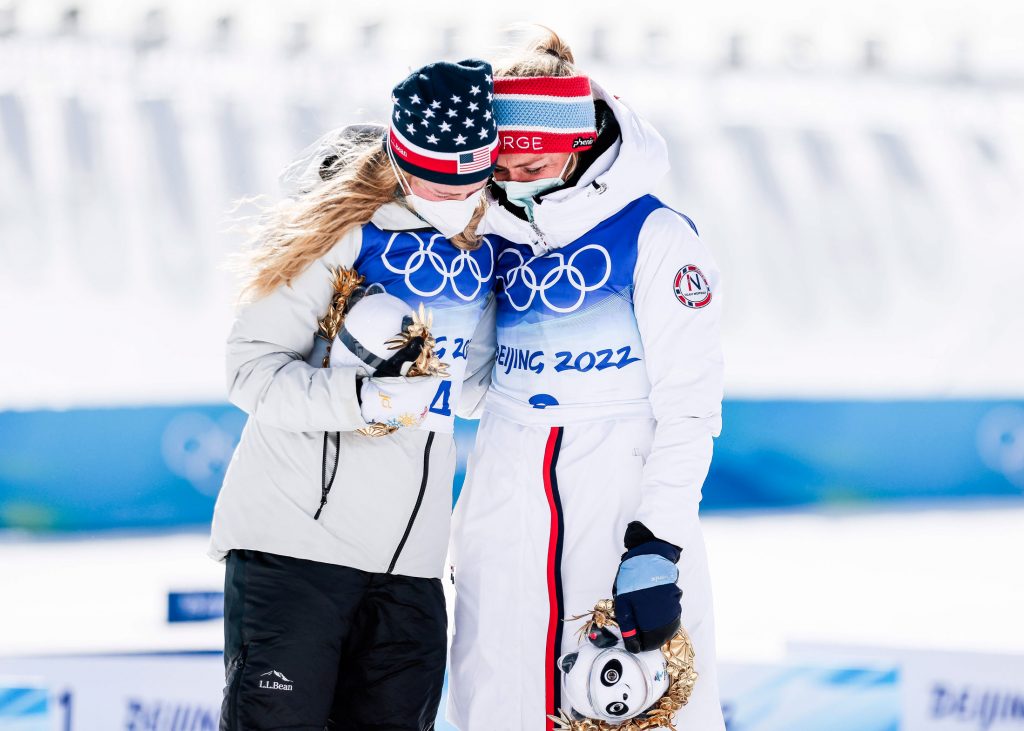
Jessie Diggins likely didn’t intend to wait until the last day of the Olympics to round out her medal collection, but the grueling nature of the race in which she did it underscored that she is, indeed, not only one of the world’s best, but one of its most versatile skiers (not to mention one of the most charismatic). She definitely didn’t intend to preface the race with a bout of food poisoning (more on that later). But as she’s shown before, Diggins thrives when the going gets rough.
On Sunday morning at the Zhangjiakou National Cross Country Skiing Center Diggins earned silver in the 30km mass start freestyle, which started three and a half hours earlier than originally scheduled because of the extreme weather. Norway’s Therese Johaug captured the gold, with a time of 1:24.54. Diggins finished 1 minute, 43.3 seconds off that pace, and Finland’s Kerttu Niskanen came in almost a minute behind Diggins for the bronze.
The silver medal came in addition to the bronze in the individual sprint freestyle that Diggins won here last week and, of course, her team sprint gold at PyeongChang in 2018. (At Pyeong Chang, Diggins finished seventh in the 30km, which was run as a classical race; she came in 37th in the 30km freestyle at Sochi in 2014.)
“That might have been the best race of my entire life,” Diggins said. “I’m not going to lie. It was also maybe the hardest race of my whole life.” That’s largely because the day before, she woke up feeling sick and spent the day in bed, dealing with her agitated digestive system. With her race status touch-and-go, Diggins took to heart some motherly advice offered in a phone call: “You don’t have to decide right now,” Diggins’ mom told her. “Wait. Just see how you feel once you’re actually racing. And then see how you feel in another 5k. And another 5k.”
It was a race of notables. Johaug’s third gold medal in China, after starting the Olympics with no individual wins, capped off what she said will be her last Winter Games. Diggins is the first non-European woman to medal in the 30km: her finish also marked the best individual performance by an American since Bill Koch’s pioneering silver in 1976. That came just a day after Scott Patterson’s eighth place in an abbreviated 50km was the best men’s distance result since Koch’s. And top-seeded Natalia Nepryaeva, of the Russian Olympic Committee, cut out of the race after the first lap, visibly struggling.
And not to be overlooked: Rosie Brennan’s strong performance—she finished sixth after skiing with the chase group the entire race—and impressive results from first-time U.S. Olympians Sophia Laukli and Novie McCabe, who skied to 15th and 18th places, respectively.
A day after the men’s 50km was shortened by almost half and delayed by an hour, the women tackled four laps on the 7.5km course in temperatures that hovered around 5 degrees Fahrenheit and amid powerful gusts that sent the wind chill factor well below zero. Each lap required 300 meters of climbing.
For a while, the lead pack consisted of Johaug, Diggins, Sweden’s Ebba Andersson and France’s Delphie Claudel. At about the 27-minute mark, however, Johaug upped her pace significantly and within minutes broke away from the others: she skied with a commanding lead for the rest of the race looking strong, relaxed and imperturbable. She had time to grab the Norwegian flag from a coach as she entered the stadium on the last lap and finish with a flourish.
Taking a cue from Iivo Niskanen, who stayed at the finish to greet the final competitor after winning the men’s 15km last week, Johaug was there to meet China’s Dinigeer Yilamujiang when she closed out the race, 25 minutes, 10.2 seconds behind the winning time.
Diggins seemed strong for the first two laps, though trailed Johaug by 27 seconds at the halfway point. By the third lap, however, she faltered a bit and Johaug’s lead increased. Diggins regained more of a steady rhythm toward the end of the lap, but, as she explained later, not without suffering. “My legs were cramping the whole last 17 kilometers,” she said. “I don’t know how I made it to the finish.”
With Johaug and Diggins so far out ahead, one of the race’s most exciting parts involved the sprint to the finish for bronze. Sweden’s Ebba Andersson had held off the chase group for most of the race, maintaining third position. But in the final lap, Brennan upped the pace and Niskanen, Sweden’s Jonna Sundling and the ROC’s Tatiana Sorina passed Andersson, who ended up falling to eighth place. Niskanen then passed Sundling in the final stretch before the finish line to nab bronze. “I told myself, ‘I’ve come fourth so many f—ing times, I’m not going to come fourth again,” Niskanen said in the post-race press conference.
Brennan admitted the race was “frustrating” for her in terms of strategy. “I wanted to try to bridge up to that top group but nobody was really interested in working with me,” she said afterward. “I had to just do it on my own, and that was hard and I paid the price at the end, which is tough to swallow.”
As the Olympics in China draw to a close, the U.S. women wrap a series of races that reflect the continued development and growth of the team. Of her own accomplishments in Zhangjiakou, Diggins said, “It’s been an emotional roller-coaster, but I am so happy we made it to the end. To have a medal in the sprint and the 30km are the ultimate bookends for me. I have been trying to be a good all-round athlete my whole life, so this has been really cool.”

